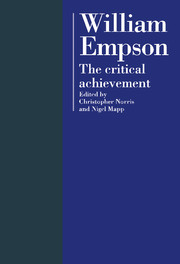Book contents
- Frontmatter
- Contents
- Contributors
- Foreword
- 1 Introduction: Empson as literary theorist: from Ambiguity to Complex Words and beyond
- 2 Empsonian honesty and the beginnings of individualism
- 3 Empson, Leavis, and the challenge of Milton
- 4 Empson's Satan: an ambiguous character of the seventh type
- 5 Compacted doctrines: Empson and the meanings of words
- 6 Figural narrative and plot construction: Empson on pastoral
- 7 More lurid figures: de Man reading Empson
- 8 Fool and pharmakon
- 9 William Empson's cosmicomics
- 10 Empson as teacher: the Sheffield years
- References
- Index
7 - More lurid figures: de Man reading Empson
Published online by Cambridge University Press: 01 June 2011
- Frontmatter
- Contents
- Contributors
- Foreword
- 1 Introduction: Empson as literary theorist: from Ambiguity to Complex Words and beyond
- 2 Empsonian honesty and the beginnings of individualism
- 3 Empson, Leavis, and the challenge of Milton
- 4 Empson's Satan: an ambiguous character of the seventh type
- 5 Compacted doctrines: Empson and the meanings of words
- 6 Figural narrative and plot construction: Empson on pastoral
- 7 More lurid figures: de Man reading Empson
- 8 Fool and pharmakon
- 9 William Empson's cosmicomics
- 10 Empson as teacher: the Sheffield years
- References
- Index
Summary
Late in Allegories of Reading, towards the end of his chapter on Rousseau's Social Contract, Paul de Man writes, ‘We have moved closer and closer to the “definition” of text, the entity we are trying to circumscribe’ (1979, p. 268) and many of his readers must lean closer to the page: here it comes!
We can think of other such points in works of criticism where analytic questioning is, for a moment, made to feel like a questnarrative, the critic pausing to invite the reader to share a sense of mounting anticipation, of getting ‘closer and closer’. There is Maurice Blanchot, on the opening page of L'Espace littéraire (1955, p. 5), gesturing at what he takes to be the region towards which his writing is moving, the pages on the gaze of Orpheus, on Orpheus' trip to the Underworld, his climb upward and then his turning to look back at Eurydice. Those pages have been frequently cited in recent years. Less familiar is an oddly apposite moment in William Empson's writing, another descent into Hell towards another woman. He is beginning his entry into the zone of maximum - that is, Type VII - ambiguity and has been discussing what Freud called the antithetical sense of primal words, citing Freud on how the primitive Egyptians used the same sign for ‘young’ and ‘old’.
- Type
- Chapter
- Information
- William EmpsonThe Critical Achievement, pp. 213 - 242Publisher: Cambridge University PressPrint publication year: 1993

